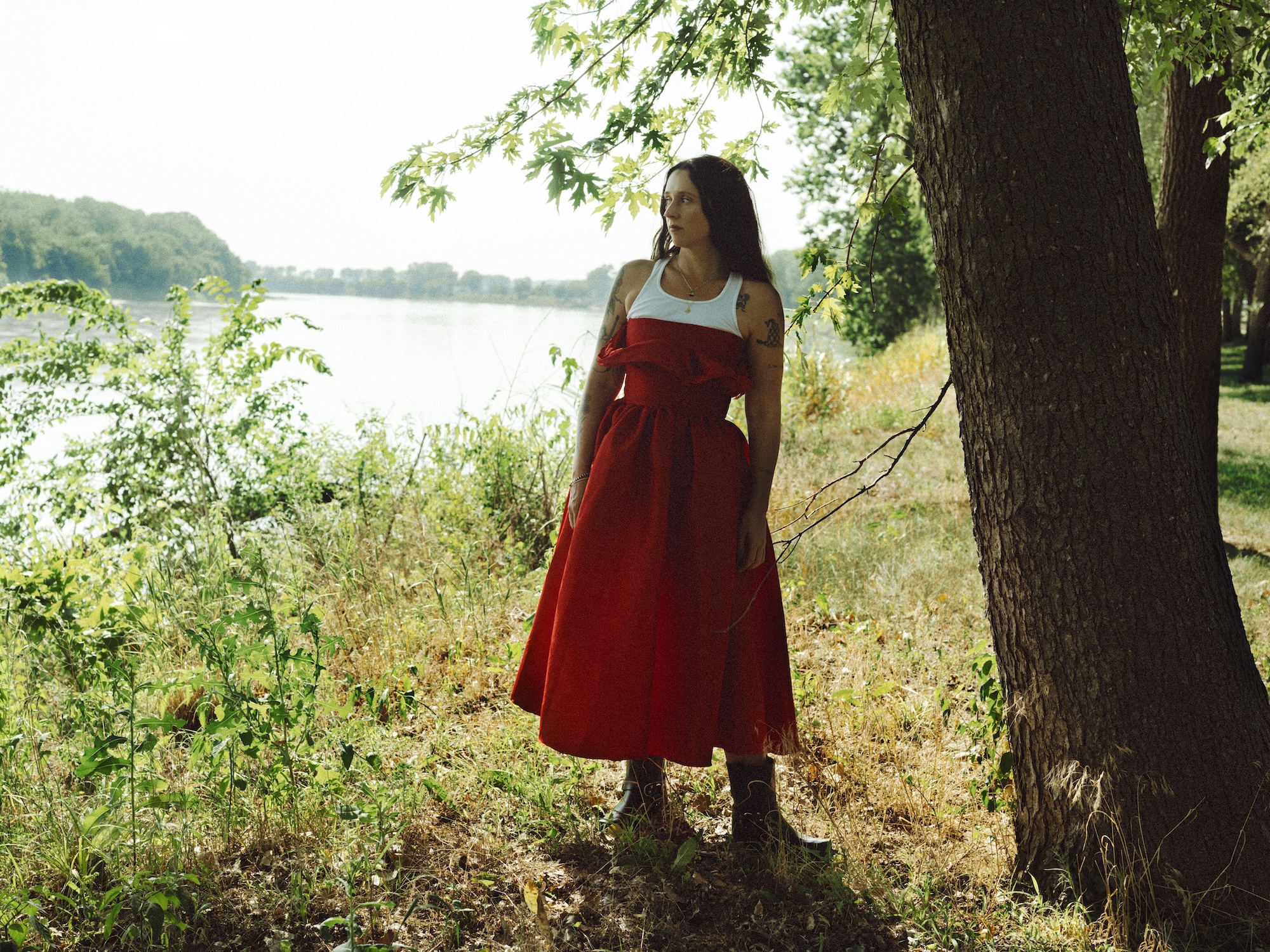WXPN 88.5 Welcomes
Waxahatchee
Tim Heidecker, Gladie

WAXAHATCHEE
One of the hardest working singer-songwriters in the game is named Katie Crutchfield. She was born in Alabama, grew up near Waxahatchee Creek. Skipped town and struck out on her own as Waxahatchee. That was over a decade ago. Crutchfield says she never knew the road would lead her here, but after six critically acclaimed albums, she’s never felt more confident in herself as an artist. While her sound has evolved from lo-fi folk to lush alt-tinged country, her voice has always remained the same. Honest and close, poetic with Southern lilting. Much like Carson McCullers’s Mick Kelly, determined in her desires and convictions, ready to tell whoever will listen.
And after years of being sober and stable in Kansas City–after years of sacrificing herself to her work and the road–Crutchfield has arrived at her most potent songwriting yet. On her new album, Tigers Blood, Crutchfield emerges as a powerhouse–an ethnologist of the self–forever dedicated to revisiting her wins and losses. But now she’s arriving at revelations and she ain’t holding them back.
Crutchfield says that she wrote most of the songs on ‘Tigers Blood’ during a “hot hand spell,” while on tour in the end of 2022. And when it came time to record, Crutchfield returned to her trusted producer Brad Cook, who brought her sound to a groundbreaking turning point on 2020’s Saint Cloud.
They hunkered down at Sonic Ranch in Tornillo, Texas–a border town known for cotton and pecans–and searched for another turn, waited for a sign. Initially, MJ Lenderman, Southern indie-rock wunderkind (much like Crutchfield when she started out) came to play electric guitar and sing on “Right Back To It.” But as soon as they tracked it, Cook told Lenderman he had to stay for the rest of the album. And he did.
“Right Back To It” is ‘Tigers Blood’’s lead single. A nod to country duets like Gram and Emmylou, winding over a steadfast banjo from Phil Cook. Together, Crutchfield and Lenderman harmonize on the chorus: “I’ve been yours for so long/We come right back to it/I let my mind run wild/Don’t know why I do it/But you just settle in/Like a song with no end.” Crutchfield says it’s the first real love song she’s ever written.
The song “Bored” opens with blase drum beats from Spencer Tweedy that crash under Crutchfield as she throws her voice high: “I can get along/ My spine’s a rotted two by four/Barely hanging on/My benevolence just hits the floor.” Lenderman’s scuzzy riffs and Nick Bockrath’s climbing pedal steel add power to the album’s most ‘Southern Rock’ a la Drive-By Truckers moment.
“365” is a story of recognition told from a hard-won place of self-acceptance/forgiveness. Crutchfield initially started writing it for Wynonna Judd, with whom she has written and performed in the past, until the lyrics started hitting closer and closer to home. The writer Annie Ernaux says, “writing is to fight forgetting.” Like Lucinda Williams, Crutchfield’s lyrics are memoir. Throughout ‘Tigers Blood’ Crutchfield is addressing a “you,” but the ‘you’ in “365” evokes raw closeness, vulnerability. “Ya ain’t had much luck but grace is/In the eye of the beholder/And I had my own ideas but/I carried you on my shoulders, anyways.”
“365” is essentially ‘Tigers Blood’’s aria about addiction, with little to no accompaniment to Crutchfield’s voice. Her backing band is hushed, as if the spotlight’s coming down on her, alone on the stage, giving her testimony. Crutchfield slings her voice with arresting precision, reaching its highest harmony on the whole album. “So when you kill, I kill/And when you ache, I ache/And we both haunt this old lifeless town/And when you fail, I fail/ When you fly, I fly/And it’s a long way to come back down.”
“365” circles back to the beginning of ‘Tigers Blood,’ where Crutchfield’s words ring clear as a bell. Album opener “3 Sisters” starts with Crutchfield singing over hymn-like piano chords: “I pick you up inside a hopeless prayer/I see you beholden to nothing/I make a living crying it ain’t fair/And not budging.” ‘Tigers Blood’ is Crutchfield at her most confident and resilient. Staring straight at the truth, forgiving but not forgetting, not batting an eye.
— Ashleigh Bryant Phillips
TIM HEIDECKER
Best known for his work as a comedian, writer, and actor, Tim Heidecker is also an accomplished musician and songwriter whose tunes don’t necessarily have to rely upon humor to succeed. While he had played in bands since the ’90s, Heidecker’s music first began winning a large audience when some of his tunes appeared on Awesome Show, Great Job, the TV series he created with creative partner Eric Wareheim, and his work appeared on two albums of music from the show. Heidecker’s love of ’70s soft rock found an outlet on a pair of albums he made with Awesome Show composer Davin Wood, 2011’s Starting from Nowhere and 2013’s Some Things Never Stay the Same. Barbed political satire informed 2017’s Too Dumb for Suicide: Tim Heidecker’s Trump Songs, while his fascination with vintage pop grew on 2019’s What the Brokenhearted Do and 2022’s High School.
GLADIE
Don’t Know What You’re In Until You’re Out, the second full-length record from Philadelphia band Gladie, opens with a contemplative instrumental called “Purple Year.” Along with acoustic strumming and a late-night wall of cricket-chirps, cello and gentle horn runs set a dewy, moonlit stage before second track and single “Born Yesterday” bursts alive with drums, bass, and bright guitar chord crunch. It’s like a cold, heart-jolting morning plunge as Augusta Koch’s familiar Philly tenor starts in: “It takes me more time, I’m a little unsteady/I was born yesterday, I forgot I could be somebody.”Koch realized while writing these songs that she had become an entirely different person: a mental, spiritual, and physical renaissance had unfolded over several years that, together, constituted an entirely new reality. Everything had changed, from relationships with friends to relationships with alcohol. Being on the other side of these tectonic shifts offered the sort of clarity that you can only get by going through the darkness: You Don’t Know What You’re In Until You’re Out. It’s optimistic, but it’s scary, too—life changes always are. Who will you be at the end of them? “Born Yesterday,” which Koch wrote about not drinking alcohol anymore, offers a critical revelation that guides the record, and which was hard-earned while experiencing the overwhelming emotional acuity that developed while living without alcohol: “The way I feel, I could fill the ocean/When the wave comes crashing in, it said I’m not a fixed thing/I’m changeable.”
“I like the idea that the record’s title can be both a positive and a negative,” says Koch. “It could seem sad, but it can also be hopeful in the sense that when you’re going through something really rough. It will get better, you will change, you will survive it, and you will be able to see it from a different perspective that you never thought you could.”Don’t Know What You’re In Until You’re Out cycles through these transitions sonically and thematically. “Hit The Ground” is a folksy, desert-drive shuffle, while “Nothing,” opening with feedback screech, is a punk-rock rollercoaster ride that rejects the American cultural drive to want more and more and more until we die: “What would it feel like to want nothing?” cries Koch.“Soda” tells a shoegazey, indie-psych love story that imagines creating our own normal when we’re around the people that make us feel seen, rejecting societal pressure to hate ourselves and feel like we’re not enough: “I like the way we live in tandem and the world we wish to see/Sweet and cheap, we thrive on less,” Koch sings on the second verse. The gentle alt-rock waltz of “Smoking” reflects on a deeply missed habit, and pensive, spacey, synth-and-cello-centric closer “Something Fragile” ends the record with as many questions as it started: “Am I something fragile or something strong?” Koch wonders, still finding her footing in strange new realities.
Don’t Know What You’re In Until You’re Out marks the first Gladie production with a set band lineup, a feature which was previously hampered by the pandemic. As a result, the LP leans into Gladie’s live energy and dynamics, moving away from the home-recorded keys and drum machines of their 2020 debut Safe Sins.Koch recorded Don’t Know What You’re In Until You’re Out at The Bunk in early 2022 with Matt Schimelfenig (guitar, keyboard, vocals), Pat Conaboy (guitar), Dennis Mishko (bass), and Miles Ziskind (drums). Schimelfenig also recorded and mixed the record, while Ryan Schwabe mastered. Mark Glick (cello), Mike Park (saxophone), and Brian Lockerm (trumpet) guest across four tracks.
Don’t Know What You’re In Until You’re Out will be released on November 18th on Plum Records, the label Koch started with former Cayetana bandmates Kelly Olsen and Allegra Anka.
-Luke Ottenhof

